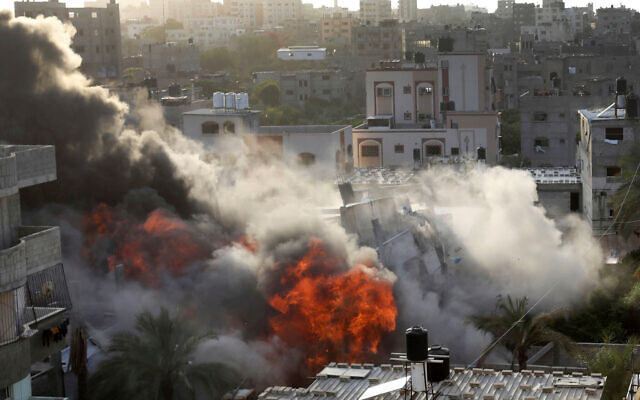Who is the enemy and why hit now?
'It is clear to all involved parties that we have just witnessed another round in an ongoing conflict'

Last week Israel initiated a military campaign against Palestinian Islamic Jihad (PIJ), hitting three leadership members of the organisation in midnight surprise air strikes on their homes, killing with them members of their families including women and children. Less than 48 hours afterwards, salvos of rockets were launched back on Israel as a retaliation, and a cycle of violence which lasted a few days was set into motion.
This scenario has repeated itself a few times in the last few years, but this time seems to be a bit different. Targeted killing of terrorists is a tactical practice Israel has carried out numerous times in the past to prevent an imminent terror attack. A simultaneous assassination of three leadership members, while taking into account that members of their families will die with them, is a different move.
Some analysts In Israel claim the attack was politicly motivated, and its main goal was to divert public opinion from the internal political turmoil. Nevertheless, political motivations are far from being enough to bring the heads of the security and legal establishments to plan, approve and execute an attack like that. This kind of act requires a different set of justifications, and I believe these are part of a wider context.
In that aspect the words of Ronen Bar, the director general of the Shin bet (Israels internal security organisation) after the Israeli opening strike, are critical. Bar exposed that the Palestinian Islamic Jihad leaders oversaw a recent scheme to produce and launch rockets from the West Bank into central Israel. Up until now, no Palestinian military group has had this ability, and Israel is determined to foil any attempt to do so.
Much was written in recent months regarding the issue of “multiple fronts”. That refers to a situation in which Israel will face a coordinated missile and rockets attack from the Gaza Strip in the south, Lebanon and Syria in the north, as well as an uprising in the West Bank from the east. Adding the threat of rockets from the West Bank would force Israel to further stretch its air defence systems.
PIJ is one of the most radical militant Palestinian groups, and is considered by many as an Iranian proxy. As such it is operating in very close cooperation with Iran’s Islamic Revolutionary Guard Corps (IRGC) leadership, which supplies the organisation with finance, training and technology.
As opposed to Hamas, which has significant restrains on its use of military force due to its position as the de facto ruler of Gaza and the political and civilian responsibilities of holding this status, PIJ lacks any of those restraints, and is therefore willing to use its military capabilities against Israel much more freely.
As part of the ongoing Israeli-Iranian rivalry, weakening PIJ as an Iranian proxy is continuous Israeli effort, not always directly connected to the developments in the Gaza Strip. A reminder for that is the fact that less than two months ago, a senior member of the organisation was assassinated in Syria, in an act that was attributed to the Israeli Mossad.
Along the events last week, Israel’s efforts to keep Hamas outside of the fighting, is another indicator that the move was not aimed to change the situation in the Gaza Strip or challenge Hamas’s dominant position. By trying to target only PIJ members and infrastructure, Israel tried to avoid the risk of escalation into a full-scale military campaign involving Hamas.
As Iran’s and PIJ’s motivations are not likely to change following the latest events, it is clear to all involved parties (in Israel and in the Palestinian arena alike) that we have just witnessed another round in an ongoing conflict that will likely will not be resolved through a military action – as tactically successful or morally challenging it is.
Dror Doron is a senior political analyst specialising in the Middle East, who has worked for the last 17 years for the Israeli government as a research and analysis expert. He lives in Australia.

comments